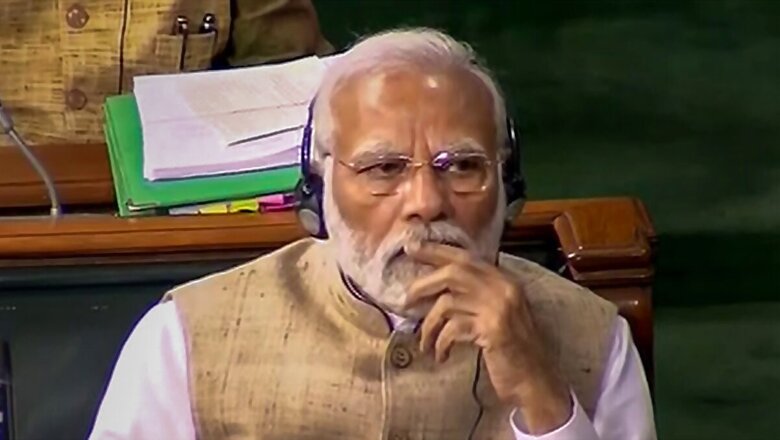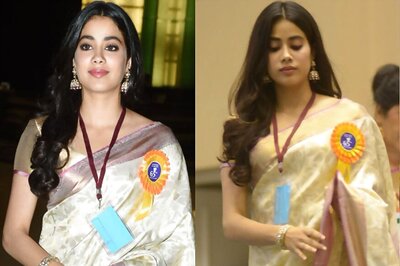
views
Prime Minister Narendra Modi’s highly anticipated response to the opposition’s no-confidence motion in Lok Sabha comes after much criticism over his alleged silence over the ethnic violence in Manipur. The din over his continued absence from parliament during the monsoon session became louder in wake of a viral video of two tribal women being paraded naked and sexually assaulted in the northeastern state.
While reinstated Congress MP Rahul Gandhi slammed the BJP government at the Centre for its failure to resolve the Manipur issue on Wednesday (August 9), many in the saffron camp are banking on the prime minister to give a fitting reply to the opposition’s accusations.
Only a few months ago during the budget session — the last time Modi spoke in parliament — after Gandhi accused the central government of being “hand in glove” with industrialist Gautam Adani, PM Modi had torn into the Congress in his two-day speech in Lok Sabha as well as Rajya Sabha.
Over the years, since the BJP came to power in 2014, Modi has delivered many memorable speeches in parliament, including one of the longest at an hour and 31 minutes.
Here are some important speeches by Modi in parliament:
February 2023: ‘2004 to 2014 lost decade, current one India’s decade’
Replying to the debate on the Motion of Thanks on the President’s address in both houses of parliament, PM Modi launched an all-out attack against the opposition, mainly the Congress, blaming it for scams and terror attacks. Lauding India’s achievements in Lok Sabha, he said India had a stable government with a firm decision making ability after decades of political instability. This was after days of ruckus in Parliament and Rahul Gandhi’s Adani speech.
Though the PM did not address the Hindenburg Research report on Adani, he said the Congress had lost out on a number of opportunities between 2004 and 2014. He said that was a lost decade but the current one since 2014 was India’s decade. He even went on to say the trust of the people (140 crore Indians) was his protective shield and the lies and abuse by the Congress could do nothing to pierce it.
Modi even called the Congress “drunk in arrogance” of its dynastic politics and questioned as to why the Gandhi family did not simply use the name of Nehru (India’s first PM Jawaharlal Nehru) as their family name once and for all. He also mentioned a Harvard University study in making his case against the Congress by saying: “Many people here have a craze for ‘studies’ from Harvard University. The university also did a study called ‘The rise and decline of India’s Congress party’. I believe every big university will study the downfall of the Congress and even those responsible for it.”
In Rajya Sabha, the PM said the Congress never tried to find permanent solutions to people’s problems while the BJP’s priority remains the public. He also took a jibe at ‘Gareebi hatao’ – an old slogan used by the Congress – and said the grand old party had done nothing to meet the expectations and aspirations of the people.
February 2020: Twin speeches amid CAA protests
The PM addressed both houses of parliament to conclude the debate on the President’s speech amid ongoing protests against the CAA across the country. It was the first time Modi spoke about the issue in parliament after addressing it and attacking the opposition for fuelling the protests in his public rallies ahead of the assembly elections in Delhi. In fact, the Rajya Sabha speaker even expunged a word from the PM’s speech, when he was accusing the opposition of spreading lies about the National Population Register (NPR).
Then speaker Venkaiah Naidu deleted the word “jhooth” from parliamentary records as Modi accused the opposition of “spreading lies (jhooth)” about the NPR. It was a rare move on part of Naidu, who routinely expunged unsuitable remarks from official records. But back in 2018, too, some words were dropped from Modi’s comments on Congress leader BK Hariprasad.
In his budget speech, however, Modi said the new reforms announced in the budget will accelerate the economy.
February and July 2018: Another no-confidence motion
On February 7, 2018, Modi delivered one of the longest speeches in parliament while replying to a motion of thanks to the President’s address in parliament. He spoke for an hour and 31 minutes. This is not the first time the PM delivered a long speech: in February 2017, while replying to the Motion of Thanks to the President’s address, his speech was an hour and 30 minutes long while in February 2016, it went on for an hour.
But his speech on July 20, 2018, after a no-confidence motion was unsuccessfully floated in parliament was also a little over an hour. While his speech was an impassioned one, this debate over the no-confidence motion will be remembered for Rahul Gandhi’s uncharacteristic move, where he walked over to the treasury benches and hugged the PM after he was done with his speech.
But Modi’s response was to accuse the Congress of spreading negativity and being “deeply opposed” to development. He had said: “What we saw among members of the opposition was sheer arrogance. The only thing they have to say — remove Modi. We are here because we have the blessings of 125 crore Indians. We are not here for selfish interests. We have served the nation with the mantra of ‘Sabka saath, sabka vikas’.”
July 2017: GST speech at the stroke of midnight
Quoting ancient Indian teacher Chanakya and the sacred Hindu text Rigveda, Modi announced the launch of the Goods and Services Tax in a historic midnight session of the parliament on the intervening night of June 30 and July 1, 2017. While the opposition boycotted the session, it was attended by high-profile guests from the business and entertainment industry. The PM said the launch of the taxation system was a path breaking moment to ensure the “pioneering future” of the country. He likened the launch of the GST at the stroke of midnight to the “most pious moment of the nation attaining freedom” on August 14, 1947 as well as when the Constitution was accepted on November 26, 1949.
May 2014: Tears in first speech in parliament house
Shortly after being appointed the prime minister of India on May 20, 2014, Modi fought back tears when he walked into the parliament house for the first time since his landslide victory in the general elections. When he spoke for the first time in the parliament house, he choked on his words while speaking about former PM Atal Bihari Vajpayee, who was not present for the momentous occasion due to ill health. In this speech, he lauded India’s democracy for its robustness as he recalled his own humble origins. It was not only him, but many other BJP leaders in the audience, including veteran LK Advani who had earlier opposed Modi’s candidature, were also seen weeping. Later, on May 26, Modi would take oath as India’s 15th prime minister. On June 11, he delivered his first address to Lok Sabha, where he spoke about the BJP-led government’s commitment to the “poorest of the poor”.


















Comments
0 comment